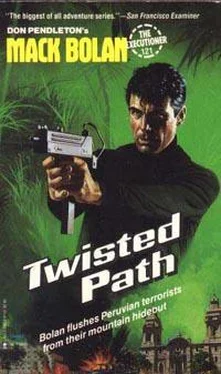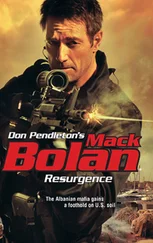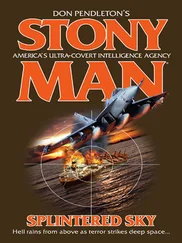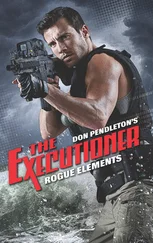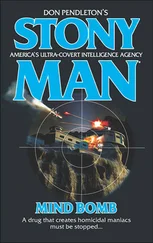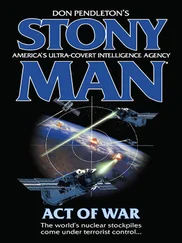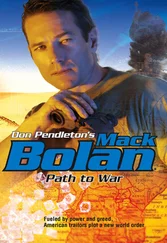From the number of nods Bolan observed, he could tell that the little man had his finger on the pulse of the community. His words had hit home in a way that Libertad had completely missed.
The terrorist looked carefully at every face in the crowd. Most turned away, but the spokesman held the hardman's gaze unflinchingly.
"You speak very bravely," Libertad remarked almost conversationally. "Who are you?"
"I am Ferdinand Haya de la Torre, mayor of the village of Andahuaylas," he answered proudly and pugnaciously. If the mayor was intimidated by the unwashed and savagelooking group that had invaded his small town, he certainly wasn't showing it.
Bolan could only admire the man's bravery without being in a position to render any assistance. The warrior had a bad feeling, looking at Libertad's closed and angry face, that the small man was going to need all the help he could get.
"PCP?" Libertad asked, naming the Peruvian Communist Party. The Shining Path had marched far to the left of the Communists, and the two groups had no love for each other.
The mayor nodded assent.
"And a Spaniard?"
"Yes, I have that honor. And a true friend to the people, not a bloodsucker who will cast them to the dogs at the first sign of trouble."
"Seize the traitor."
Two of Libertad's men responded, grabbing the small man and hauling him in front of the crowd.
None of the villagers ventured forth to intervene in the face of the intimidation of the Path.
De la Torre was temporarily struck dumb, realizing that he had overplayed his hand badly.
Bolan knew that a tragedy was about to unfold, one that he couldn't do anything to prevent.
The terrorist addressed the crowd. "Comrades, you have been duped unbecoming slaves of the unjust state. We will now stage a popular trial to probe the errors of your ways." He turned to the captive mayor. "I suppose you were elected?"
"Yes, by a free vote of these honest villagers," the mayor responded.
"Guilty! He is guilty of parliamentary cretinism," Libertad shouted to the impassive gathering. "He believes that a vote can determine the best interests of the people." Then he addressed de la Torre again. "I suppose you are an educated man?"
"I have finished high school in Ayacucho. I can read and write. Can you say the same?"
"I do not need to justify anything. I am a warrior of the Republic of New Democracy, the only true representatives of the people. What the great Gonzalo says is law, and I must carry out his work of crushing counterrevolution everywhere I find it." Libertad paused, examining the community.
They had subsided into sullen acceptance, knowing that their fate was to endure like the Andes, to suffer the shifting patterns of the unended war. "Don't think about tomorrow" had to be their watchword. "Just live through life one day at a time." The Incas, the conquistadores, parlia meets, juntas, dictatorships had all come and gone without making much impression on their way of life.
The Shining Path was only one more natural disaster, like an epidemic among the sheep.
Libertad read acquiescence in the crowd. "This man is guilty once again, this time of being an intellectual planted among you to lead you falsely from the road to the utopian Communist state. Where there is guilt, there must be punishment."
He moved slowly to the captive, drawing his knife. The late-afternoon sun caught the blade, sending shimmers of orange fire crawling along the steel.
The mayor didn't protest, mesmerised by the flashing weapon that would be his death.
The terrorist grabbed de la Torre roughly by the hair, pulling his head back. The mayor snapped out of his spell and began to pray feverishly.
Libertad silenced the pleas to heaven, drawing the sharp edge almost leisurely across the man's throat.
The terrorists holding the body let go, allowing the corpse to collapse face first onto the blood-drenched square.
"Now you will aid us," Libertad told the gathered peasants in a commanding voice.
No one disagreed this time.
The Path left the little community the next morning after they had fed themselves from the locals' meager supplies. They traveled in a small convoy of four old cars commandeered from the villagers.
An hour's drive ahead was a small pass, one that alternated direction on a daily basis.
Today they would be able to travel through it away from Ayacucho, which was the only reason the terrorists had remained overnight in the hostile town.
Bolan had been glad for the delay. Now he seemed to be over the worst of the soroche, although he still had a headache. However, he was careful not to let his well-being show. He didn't know what was coming and would rather save his renewed energy for a surprise.
Libertad paid Bolan no real attention, merely gesturing him to the third car in line, which was a battered Honda. The terrorist leader slid into the front passenger seat and stared stonily out the window, as did Bolan.
The Executioner could never hope to understand the terrorist mind. Their fanaticism was total, requiring a dedication that embraced their entire lives. They weren't in it for the money they were after power pure and simple. If they ever achieved it, Bolan suspected that the bloody purges of Joseph Stalin would seem like a spring cleaning in comparison.
They killed easily and without conscience or regret; Libertad had demonstrated that yesterday, if Bolan had had any doubts. For the Shining Path, the world was a simple place. It divided evenly along the lines of good and evil, the good being their supporters. Evil embraced everyone else.
In any situation there was only one course of action: do as their leader Gonzalo commanded through his writings, or die.
They were totally beyond rational thought. It was incredible to see how they had warped every perception around the distorted thoughts of some reclusive madman.
There was an ugly fascination in studying these men, much like watching cancer cells divide and multiply through the lens of a microscope.
The answer to their bizarre zealotry was equally clear to Bolan. He would crush the Shining Path and all they stood for at the first opportunity.
The convoy ran into trouble just as it left the ten-mile section of one-way road, no wider than one car, that crept along the edge of the deep mountain cleft. If the driver had sneezed and jogged the wheel, they would have dropped one mile into the swift mountain stream below.
The lead car eased around the first curve beyond the widening of the road and ran into a hornet's nest.
A line of troops was concealed behind a pair of tree trunks that had been toppled across the roadway. How the ambushers had known to expect the Path was a mystery. There might have been a radio hidden in the village, or possibly a peasant had trekked overland to the nearest government outpost.
Any way it happened, the infantrymen spelled disaster. They opened fire with an array of automatic weapons, peppering the thin skin of the car with high-velocity slugs.
The driver slumped forward over the wheel, his brains sprayed over the three passengers behind. As he collapsed, he rode the wheel to the left, sending the car speeding over the cliff The four terrified survivors screamed every second of the long drop, before the plunging vehicle hit the ground below with the force of a dynamite explosion.
The second driver slammed on the brakes, screeching to a halt thirty yards from the roadblock. The gunman in the passenger seat, who was the only one armed with anything deadlier than a knife, provided covering fire from behind his door while the others made a break for the grassland and hills that edged the highway.
None of them made it to the edge of the grass before being chopped down by the flying parabellums.
Читать дальше
